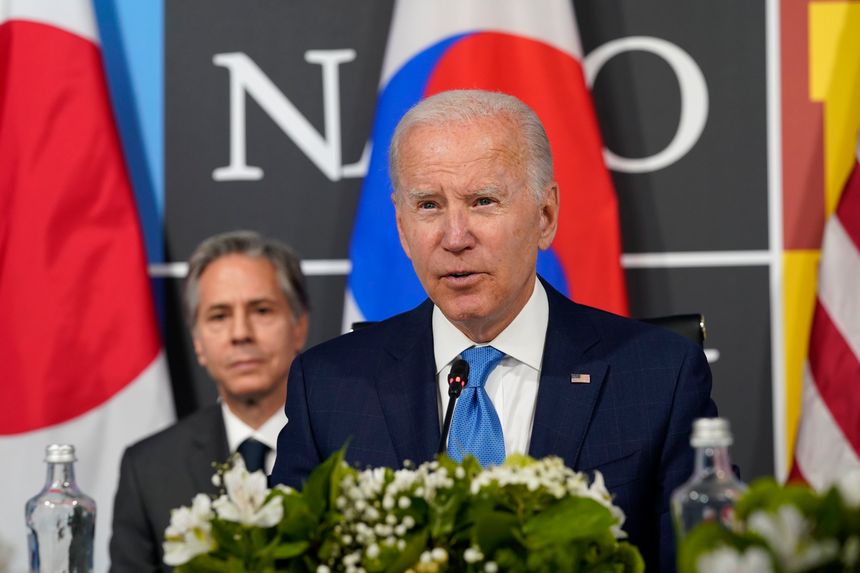No matter what you call it, the Joint Comprehensive Plan of Action—JCPOA for short or “Iran nuclear deal” for convenience—is in trouble. Since Donald Trump pulled the U.S. out of Barack Obama’s agreement that ended economic sanctions on Iran in exchange for temporary limits on Iran’s nuclear activities, the deal has been the Schrödinger’s cat of diplomacy—sealed in a box, neither dead nor alive but in some indeterminate state.
These days, however, the stench from the box is getting harder to ignore. As Iran approaches the nuclear threshold, the saga seems to be moving toward a close.
In December Secretary of State Antony Blinken told reporters that “what we will not allow is for Iran to, in effect, tread water at talks, while at the same time advancing its program.” Iran was not deterred and has been merrily treading water and advancing its nuclear program ever since. Last week Britain’s intelligence chief told reporters that Iran had decided to reject America’s terms for re-entering the deal, though it was happy to let negotiations drag on. Last week the International Atomic Energy Agency’s head, Rafael Grossi, said that Iran’s nuclear program is “galloping ahead.”
Even the most optimistic Washington insiders are losing hope. In lead negotiator Robert Malley’s words, “You can’t revive a dead corpse.”
One reason for letting talks drag on inconclusively for so long is the unappetizing consequences of admitting their failure. The definitive end of the Iran deal would almost certainly force the administration to choose between accepting a nuclear-armed Iran and initiating a confrontation likely to culminate in another American war in the Middle East. Both courses of action entail unpredictable but large risks and costs. Avoiding this ugly choice has, understandably, been the Biden administration’s central goal in the region.
Unfortunately, time wasn’t on President Biden’s side. The Iran negotiations have moved toward failure as America’s international position grew less secure, and today the deal’s impending collapse is part of a global crisis of American power. With Russian missiles raining down on Odessa and China threatening massive consequences if House Speaker Nancy Pelosi goes to Taiwan, the administration is already grappling with an international situation far graver than anything it expected or prepared for. Whatever their long-term concerns about a nuclear Iran, both Xi Jinping and Vladimir Putin seem more interested in stiffening Iran’s commitment to the anti-American alliance than in facilitating an agreement that would reduce the pressure on a beleaguered American president.
Americans need to see Iran’s nuclear push in a global context. The crisis with Tehran comes at an extremely beneficial moment for Russia and China. Our opponents hope that simultaneous geopolitical crises in Europe, the Middle East and East Asia will overwhelm a dazed and weary America. As the economic consequences of those crises ripple through the U.S. and global economies, the revisionists hope that America’s cohesion at home and alliances abroad will weaken as the threats grow. To prevent that, Team Biden needs to restore a sense of deterrence and caution to adversaries who have enjoyed a long run of success.
If the U.S. is going to develop an effective response to this combination of strategic threats, our political leaders will have to move beyond finger pointing and blame games over the fate of the JCPOA. Republicans can say justly that Mr. Obama’s decision to sign something as consequential and controversial as the Iran nuclear deal without the bipartisan support needed to get a treaty ratified in the Senate was a historic mistake. Democrats can reasonably riposte that Mr. Trump’s unilateral withdrawal made everything worse. Such matters can be left to the historians. The question before us now is not who was right in 2015 or 2018. It is what we do next.
Mr. Biden has repeatedly said that allowing Iran to build nuclear weapons is not an option. If his administration fails to hold that line, the consequences for American power in the Middle East and globally would be profound and perhaps irreversible. If America attacks Iranian nuclear facilities and finds itself stuck in yet another Middle Eastern quagmire, the effects at home and abroad will also be dire. China and Russia would take advantage of America’s Middle East preoccupation to make trouble elsewhere, and U.S. public opinion would be further polarized.
Few presidents have faced policy choices this tough or consequential. It’s understandable if not commendable that the administration postponed the day of reckoning for so long, but as the dead-cat stink intensifies, Mr. Biden is coming closer to the greatest test of his career.



